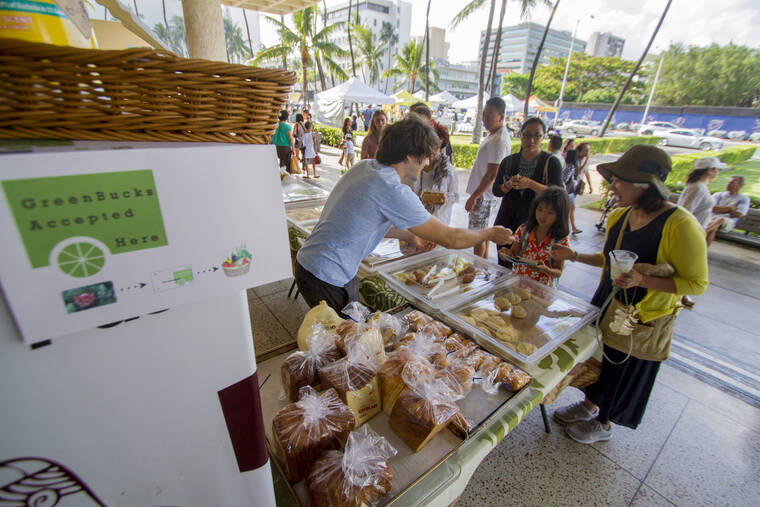Rule change will increase food aid for Hawaii families
An internal rule change at the state Department of Human Services will mean 13,000 to 14,000 Hawaii households will be eligible for another $40 million to $45 million — or an average of $3,200 a year — in SNAP benefits, commonly known as food stamps.
Currently, a family of four can receive as much as $1,759 a month, totaling more than $60 million.
ADVERTISING
The additional money all would come from the federal government after DHS makes what’s known as an administrative rule change to eliminate Hawaii’s “net income limit” for SNAP eligibility, said University of Hawaii assistant professor Dylan Moore of the University of Hawaii Economic Research Organization.
Moore and Nate Hix of the Hawai‘i Institute of Public Health began researching how to get more financial help for what Moore called “lower, middle-class households” about a month ago after they “stumbled across this possibility” during a discussion.
Current income eligibility rules to receive SNAP benefits actually punish low-income families that try to earn more money to get ahead, only to have their benefits reduced, Moore said.
In a UHERO report, Moore wrote that “households can lose thousands of dollars in benefits if their income increases by even a small amount. This (‘benefit cliff’) is one of the largest in any U.S. welfare program, potentially discouraging work and creating arbitrary differences in support for households with similar economic circumstances. The report estimates for a family of four, ‘falling off’ the cliff will cost more than $10,000 a year in benefits — a large sum for a household that would be earning, at the very most, $69,000/year in income.”
Moore and Hicks then approached DHS officials with their findings and said DHS could make an internal administrative rule change that would not require legislative approval.
DHS officials were “highly receptive,” Moore told reporters Monday.
But changing the rules will be easier than putting them into practice through DHS’ antiquated 1980s-era information system, DHS told the Honolulu Star-Advertiser later Monday.
In a texted statement, DHS officials said they are working on a plan.
They first have to assess the ability of the department’s Hawaii Automated Welfare Information eligibility system to adapt to the changes.
The HAWI system, as it’s known at DHS, “may not be able to support this policy change without significant modifications,” DHS said. “DHS is also currently working on the development of a new eligibility system to replace HAWI; however, the new system is still in the testing and development (sic) we are working with our vendor to implement as soon as possible hopefully having it ready by early 2025.”
The changes align with DHS’ “overall mission to encourage self-sufficiency and support the well-being of individuals, families, and communities in Hawaii,” DHS said.
Like other states, Hawaii in 2010 eliminated SNAP asset limits for most Hawaii residents and increased the “gross income limit” to twice the federal poverty line.
But unlike other states, Hawaii maintained its net income limits.
By eliminating the net income limits, Hawaii would have to pay half of the cost to implement the changes.
But Moore and Hicks calculated that every additional $1 that DHS spends will result in $18 more in federal funding for every low-income household.
“This change would eliminate arbitrary unfairness from the tax/transfer system, and to ensure that those who want to earn more money will gain rather than lose as a result of their efforts,” Moore wrote. “Most policy decisions are hard. This one is not.”
He told reporters that changing eligibility rules to get low- income families more federal aid “matters more in Hawaii than in other states … because of our higher cost of living.”
Later Monday, Green announced that the impending rule change at DHS had been prompted by the UHERO study.
Green said in a statement, “This is going to provide a huge relief for our working-class families who are struggling with Hawai‘i’s highest-in-the-nation cost of living. In identifying a critical opportunity for our SNAP program, UHERO’s research team is enabling us to make much-needed changes to our social welfare system so that families living from paycheck to paycheck can afford to put more food on their tables.”
SNAP remains one of Hawaii’s largest welfare programs for low-income families, Green said.
SNAP eligibility requirements had been controlled by the federal government until 2000, when states were given more flexibility through what’s known as a “broad-based categorical eligibility” program, Green said.
Households with high savings, however, were ineligible for SNAP benefits. But the BBCE program also allows states to raise limits on the amount of income that households can receive and still qualify for SNAP.
“Net income” — when used for the SNAP program — is defined as the total monthly household income after deducting certain nonfood household expenses like rent, utilities, medical costs, child care costs and others, Green said.
Before BBCE, households needed to have a net income below the federal poverty line, Green said.
In 2019, Hawaii’s share of SNAP administrative costs represented about 5.6% of the amount of SNAP benefits that the state paid out, Green said.


